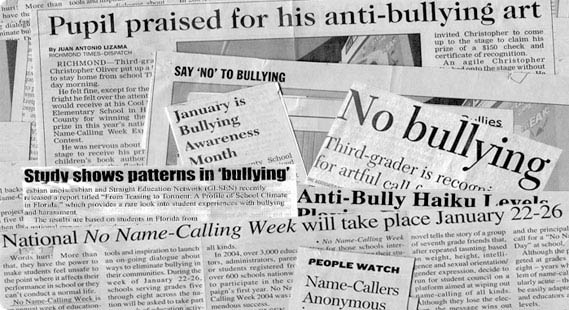"Call Bible things by Bible names." Have you ever heard that maxim before? I grew up hearing it, mostly in reference to naming things. Nondenominational groups of all stripes have long been against calling a minister "pastor," a word that references elders in the New Testament. Or calling a church by a person's name instead of using a biblical name like, "The Way."
However, I spent a long time thinking about that slogan from another perspective recently. In my older daughter's Sunday School class the teacher and another student had had a spirited discussion on an unfamiliar topic: bullying.

"Bullies" by Original uploader was Bpenn005 at en.wikibooks - Transferred from en.wikibooks; transferred to Commons by User:Adrignola using CommonsHelper.. Licensed under Public domain via Wikimedia Commons.
The teacher felt that "bullying" had been blown all out of proportion and that if we left kids alone or exercised some old-fashioned discipline things would be better. The other student in the class had been the victim of school-yard bullies and felt that all bullying was terribly wrong. At cross purposes, they were having trouble communicating.
My girl thought that neither of them was wrong, they just lacked a good definition of the word.
Since I agreed, I challenged her for her definition.
After some more conversation we came up with "bullying is an abuse of power - physical, emotional, intellectual, social or otherwise." But then it struck me. We weren't calling Bible things by Bible names.
What I mean is this: the term "bullying" is a modern sin. They have commercials about it on Cartoon Network, and you can get kicked out of school for doing it. If you consider hazing or sexual harassment a type of bullying, then the penalties could include losing a job or facing jail time. If it is wrong, and I think after it's defined as an abuse of power we can all agree that it is, then God ought to have spoken about it, right?
Of course he did.
When we face one of these modern sins or for that matter modern virtues, we need to ask ourselves, "What Bible word matches this?"
My daughter after some debate decided that depending on the specifics of the situation it was probably either pride or hatred. Does that sound over the top to you? It shouldn't. What could be more prideful than boastfully putting people down, day after day, rejoicing as they become less and you become more? What could be more hateful than deriving pleasure from making someone else miserable?
Knowing what to call a problem is of course only the beginning. The bigger question is what to do with it. As my daughter's teacher pointed out "talking it out" is often ineffective. Teachers often lack the power to effect real and useful change. Even the other student so incensed by bullying didn't have a clear solution.
However, if bullying is simply a modern word for a pair of ancient sins, we know exactly what to do. Hate is combated by sacrifice, forgiveness, love and trusting that God will bring justice rather than taking justice into our own hands. In fact, any child confronting a bully should be schooled in the life of David, who responded with unfailing godliness in the face of Saul's murderous intentions. Pride is combated not by increasing self-esteem but by a realistic view of human beings. We are one and all made in the image of God and therefore immensely valuable. We are one and all sinners who are or have stood in rebellion to our loving father and therefore once his enemies. There is no room there for pride. We discipline our children in a loving manner seeking to adjust their hearts. As they grow older, we press them towards the only cure for slavery to sin, becoming a slave of Jesus Christ instead!
I want to challenge you think over phrases like "strong-willed child," "self-esteem" and "values" and ask yourself what the words really mean. And since you won't find them directly in the Bible ask yourself what virtues and vices are hiding behind them. Let's call Bible things by Bible names!
Leave me a comment and tell me what you think about bullying and the other modern words.
Helene
Scripture taken from the NEW AMERICAN STANDARD BIBLE(R), Copyright(c) 1960, 1962, 1963, 1968, 1971, 1972, 1973, 1975, 1977, 1995 by The Lockman Foundation. Used by permission.
No comments:
Post a Comment